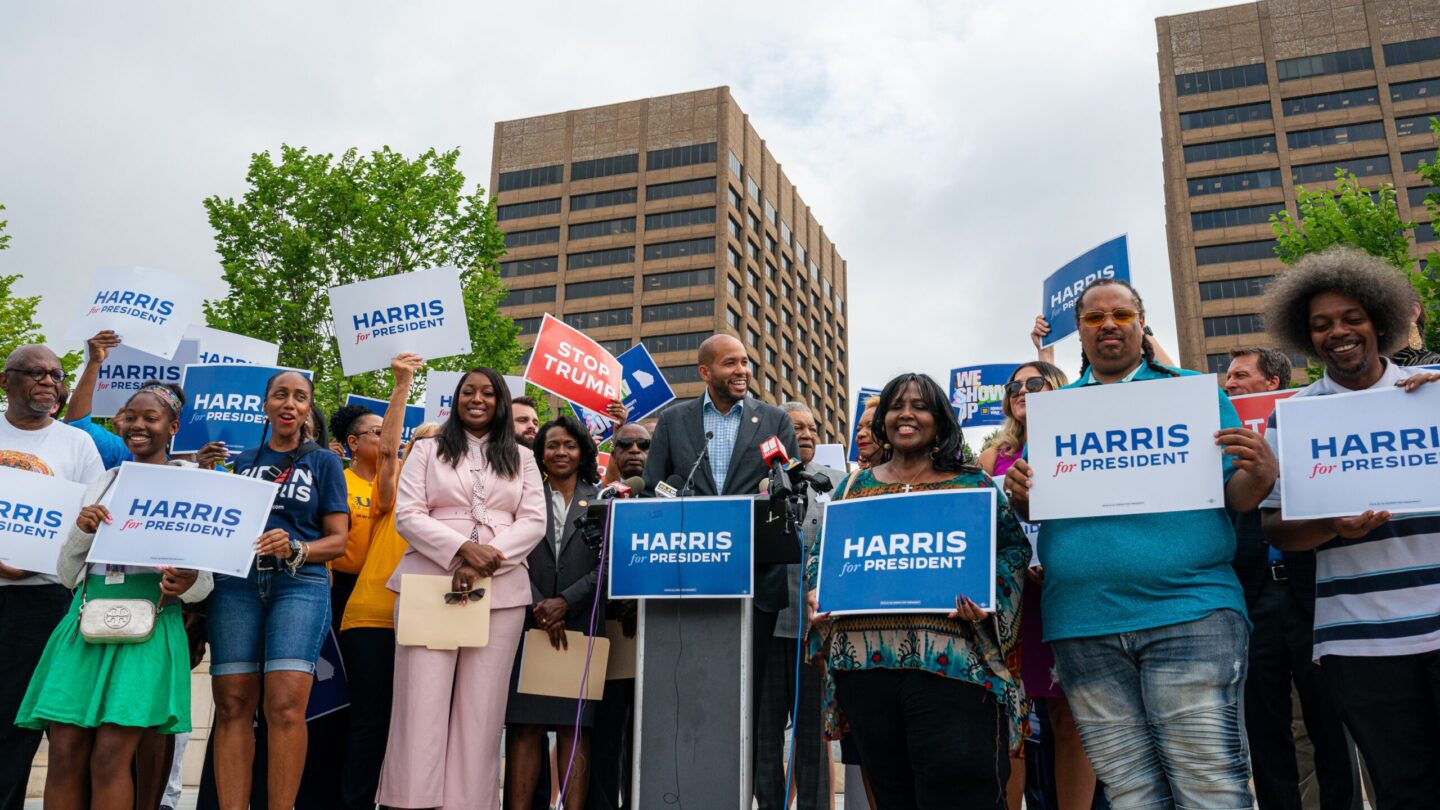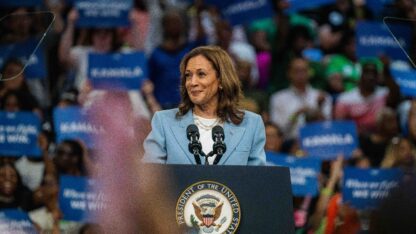The day after Vice President Kamala Harris entered the race for the White House, Democratic Rep. Dan Kildee’s Michigan campaign office saw 650 people sign up to volunteer.
The next night in Nevada, Rep. Steven Horsford had another 600 volunteers register in his Las Vegas-area district. Pennsylvania Rep. Madeleine Dean’s constituents were “fired up.” New Hampshire Rep. Annie Kuster felt “palpable” enthusiasm. And by week’s end, Illinois Rep. Jan Schakowsky’s team had 400 volunteers ready to “get on the bus” to campaign for Democrats in neighboring Michigan and Wisconsin.
“The theory of the case is proving true: There’s a renewed enthusiasm within the Democratic Party for our candidate at the top of the ticket,” said Rep. Angie Craig of Minnesota, who had been among Democrats calling for President Joe Biden to step aside.
Weeks of despair among Democratic lawmakers that Biden would not only lose the White House but take congressional candidates down with him disappeared in a blink. The 2024 campaign’s static inertia was transforming into kinetic political energy after Harris took hold of the party, stunned the establishment and shook up the race against Republican Donald Trump.
Women, young people and voters of color started suddenly flocking to the Democratic campaigns. The congressional campaign committees for the House and Senate Democrats reported record-setting $1 million days for online donations, among the highest in history. Lawmakers said people showed up without prompting, asking what they could do to help.
The turnaround, just over 100 days from the election, revives the party’s hope of winning back the House and fighting to hold its Senate majority. Rather than simply being seen as a last line of defense against Trump and the Project 2025 agenda, the potential for broader Democratic wins is coming into view, despite Republican assertions that the Harris boost is a blip that won’t prove lasting.
Harris’ rise quickly quelled, for now, the painful party revolt that had thrown Democrats into weeks of anguished anxiety.
“We’re sort of right on the cusp of both existential dread and excitement for making history,” said freshman Rep. Melanie Stansbury of New Mexico.
The House in particular has been reeling from the chaotic turn of events. The party angst over Biden’s ability to lead the ticket spilled into the open after his disastrous debate performance called into question his age, 81, and his ability to serve another term.
Lloyd Doggett of Texas, the first Democratic lawmaker to call for Biden to withdraw from the race, said, “I think we were on a path to lose this election, and now we have a fighting chance to win it.”
For some, the energy and enthusiasm they are witnessing reminds them of 2008, when a young U.S. senator, Barack Obama, powered his longshot White House bid with a new coalition of Democrats, fueled partly by young millennials.
Horsford, who was among Obama’s earliest backers in Nevada, remembers the throngs of young people who worked as part of a multiracial, multigenerational coalition. And that’s what he sees now “coming out of the woodwork” to help Harris.
“It’s actually more than a campaign now,” Horsford said. “It’s a movement.”
Both the House and Senate are fiercely contested this election year, with razor-tight majorities heading into November, which means just a single seat can determine which party holds power.
In the House, some 40 seats are considered competitive, and any one of them could make or break the outcome, determining whether Republicans keep their slim majority or Democrats wrest control.
The Senate is tougher for Democrats, a candidate-versus-candidate contest less beholden to the top of the ticket. Senate Democrats hold the majority by a single seat, and among the most endangered incumbents, Montana’s Sen. Jon Tester, has yet to back Harris. A 50-50 Senate would give power to the party in the White House because the vice president can cast tie-breaking votes.
Republicans handling the House and Senate races are racing to redefine the presidential matchup with Trump, largely by defining Harris on their own terms.
GOP strategists believe the sudden flurry of support for Harris will fade and the Republicans like the prospect of replacing “Scranton Joe” with a “San Francisco liberal” who will own the Biden administration’s record on border policy and inflation, which are tops on voters’ minds.
“This whole, short-lived Harris honeymoon is over,” said Sen. Steve Daines of Montana, the chairman of the National Republican Senatorial Committee.
“Age was the issue for Biden. The issue for Kamala Harris will be her far-left policies,” Daines said. “The nation is not going to elect a far-left, San Francisco radical.”
Jack Pandol, the spokesman for the House GOP’s National Republican Congressional Committee, said House Democrats are falling in line with Harris’ “extreme agenda to remake America in the image of San Francisco,” and they risk losing their elections over it.
The dynamic is being put to the test in real time as lawmakers in competitive seats watch the political ground shake beneath them in the presidential race.
“We have seen a night-and-day difference in every aspect of my campaign,” said Democratic Rep. Pat Ryan of New York, who was among some three dozen congressional Democrats who publicly called on Biden to pass the torch.
Fundraising, grassroots support and volunteer energy all soared “through the roof” since the hand-off to Harris, he said. “This is really electrifying our campaign.”
But in another competitive New York district, Republican Rep. Nick LaLota predicted when “the dust settles, my constituents will understand that life would be even worse under a Harris administration.”
To be sure, not all Democrats in Congress wanted to see Biden end his campaign for a second term.
Democratic Rep. Maxine Waters, a senior member of the Congressional Black Caucus, said she was disturbed by the calls for Biden to step aside after all she said he has done as president.
In particular, some lawmakers worried that Harris would be thrust into the fray without adequate party support or simply be passed over as Speaker Emerita Nancy Pelosi and other prominent Democrats initially called for an open primary if Biden were to be replaced.
But once Biden decided it was “in the best interest of my party and the country” to end his bid, even some of those most resistant to the change welcomed the outcome.
Waters said there was such an outpouring of interest in Harris from her Los Angeles-area district that she was rushing home Friday to throw an organizing event. “We’re going to be jamming,” she said.
“He endorsed a woman — a woman of color — and it drew everybody into a new kind of possibility that could happen in this country,” she said.









